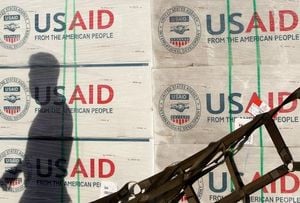Thailand’s government is implementing new measures aimed at boosting the agricultural sector, particularly focusing on supporting rice farmers against fluctuated market prices. On February 23, 2023, during a recent meeting, officials announced their commitment to helping farmers stabilize their income and reinforce crop sales throughout the nation.
According to Witthakorn Maneetret, the Director-General of the Internal Trade Department, the government has devised three significant measures intended to assist rice farmers during the 2023 rice growing season. He emphasized, "I want farmers to know the government has considered carefully for the benefit of Thai farmers." This statement signifies the government’s intention to provide tangible support amid fears of price instability.
First, the administration will introduce loan assistance schemes aimed at offering financial relief to rice producers. Under this initiative, farmers who store their crop can receive financial support of 1,000 baht per ton from the government. If the farmers have their own storage facilities, they may obtain additional funds amounting to 1,500 baht per ton, potentially benefitting around 1.5 million tons of rice, with the government earmarking 1.219 billion baht for this purpose.
Second, the establishment of immediate purchasing points is set to facilitate direct sales from farmers, allowing those without agricultural cooperatives to sell their rice on the spot at competitive prices. The government will back this initiative by providing operational costs of 500 baht per ton of rice. This purchasing scheme aims to buy approximately 300,000 tons of rice at the market price, enhancing liquidity for farmers most vulnerable to market pressures.
Finally, the measures include interest compensation for rice traders who agree to store crops. This strategy is expected to stimulate the market by ensuring continued demand for rice even when prices are low. It includes provisions for compensation at 6% on interest for the traders, who must purchase rice from farmers at above-market pricing.
These measures not only reflect the government’s proactive approach to preventing potential agricultural crises but also signify its broader strategy of enhancing the rural economy. With reliance on agriculture still predominant among many Thais, the stability of rice prices is seen as fundamental to the nation’s overall economic health.
Witthakorn reiterated the importance of these initiatives, stating, "This year, measures to assist rice farming have been carefully structured to benefit Thai farmers comprehensively and sustainably.” This assurance aims to instill confidence among farmers struggling with economic challenges and rising operational costs.
Difficulties faced by farmers include the rising costs of fertilizers, seeds, and other necessary farming materials. These measures, hence, are expected to lighten the fiscal burden on them and facilitate improved productivity.
With measures such as these, the government aims to strike a balance between fostering growth and ensuring stability within the agricultural markets without disrupting natural competitive practices. Previous government strategies have often drawn criticism for over-regulating agricultural practices, leading to calls for more sustainable approaches.
By reinforcing the identity of agricultural contributions to Thailand, there seems to be renewed hope for the local economies reliant on rice farming and related industries. The government’s outlined roadmap may just be the impetus needed to revitalize investments, both local and foreign, ensuring continual growth.
This collaborative approach between government and agricultural communities aims to create pathways for economic development, ensuring farmers can thrive rather than merely survive. Only time will tell how effectively these strategies are implemented and their subsequent impact on the agricultural sector, but the commitment shown signifies steps toward securing Thailand's agricultural future.



